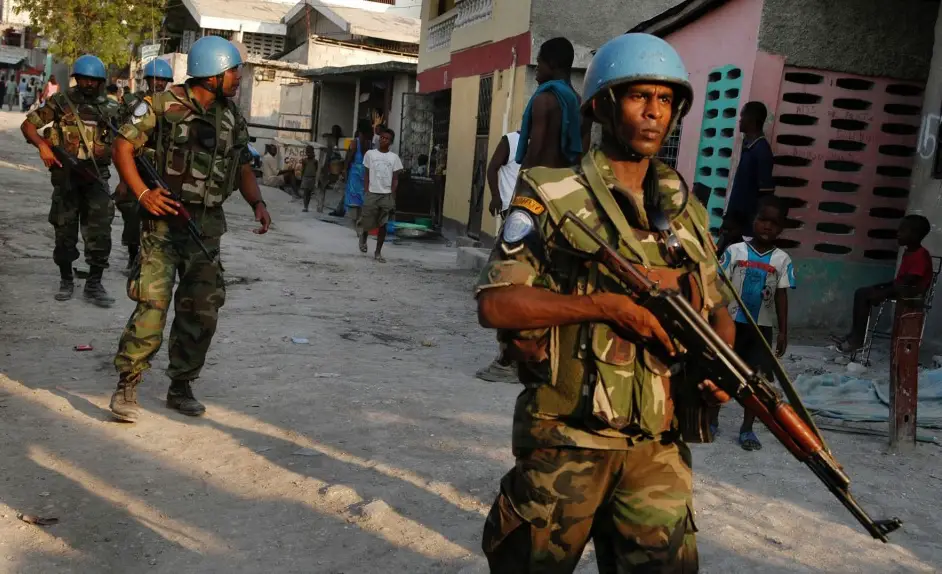On January 6, 2025, journalists David Adams and Frances Robles published the report “Massacre after massacre: Haiti’s grim spiral into a failed state” in the New York Times. The article highlighted the collapse of public security in the country, revealing Haiti’s institutional fragility in the face of advancing gangs and the local government’s inability to address the crisis. Months later, on June 25, Robles revisited the topic in “A year after the landing of an international force, Haiti is no closer to peace”, advocating for a more decisive response from the international community, especially the United States, the main funder of the latest UN mission in Haiti (Multinational Security Support – MSS).
Beyond the data and analysis of the violence devastating the Haitian population, one expression stands out: “failed state.” More than a technical diagnosis, the term carries significant political, symbolic, and historical weight. It has been widely used by government officials, academics, and the media—particularly in the United States and other countries—to describe Haiti’s condition. Its frequent use reinforces the perception of Haiti as incapable of self-governance, thereby legitimizing external actions under a supposedly humanitarian guise.
In 2022, former U.S. ambassador to Haiti Pamela White stated during a hearing before the House Committee on Foreign Affairs that “Haiti is a failed state,” and called for immediate military intervention: “What is needed now is not a complicated five-year plan, but boots on the ground—now.”
This logic is also present in recent publications affiliated with universities, such as the article “Haiti is nearing failed state status,” published by News@TheU at the University of Miami (2024), as well as in influential think tanks, including “Is Haiti a failed state?” by the Center for Strategic and International Studies (2019), and “Ask the experts: What drives Haiti’s fragility?” by the United States Institute of Peace (2022).
These examples are not exceptions; they are part of a structured narrative. Despite growing criticism of the term “failed state” after the War on Terror—including the renaming of the controversial index developed by the Fund for Peace from “Failed States Index” to “Fragile States Index” in 2014—the expression continues to circulate in political, academic, and media discourse.
This narrative operates on multiple levels: it simplifies Haiti’s crisis, conceals its historical roots, and promotes external solutions as the only viable ones. Far from being neutral or merely descriptive, it draws on a global epistemic hierarchy that privileges Western state models while delegitimizing local forms of organization and resistance. In doing so, it constructs a racialized image of Haiti as ungovernable, violent, and dependent—thus reinforcing the logic of intervention and external control.
Haiti was the first Black republic in the world, born out of a successful anti-slavery revolution in 1804 that defeated Napoleon’s army and defied the colonial system. Since then, Haitian history has been marked not only by internal instability but also by recurrent foreign interference, economic sanctions, military occupations, and the imposition of governance models incompatible with its social and political reality.
Ignoring this historical context is part of the problem. By insisting on the label “failed state,” international discourse overlooks the structural causes of Haiti’s crisis: prolonged economic exploitation, historic debt burdens, trade sanctions, deliberate weakening of national institutions, and the repeated failure of foreign interventions. Even worse, it presents failure as intrinsic to Haiti, rather than as a product of broader historical and political processes.
Silencing alternative forms of governance
This rhetoric also functions as a tool to erase alternative political structures within Haiti. Local initiatives of self-management, community resistance, and popular sovereignty are often dismissed or delegitimized for not fitting liberal Western molds. This reinforces the idea that Haitians are incapable of self-governance, repackaging 19th-century civilizing discourses under a supposedly technical veneer.
The selectivity of this narrative is also striking. Countries in the Global North facing deep institutional crises, democratic erosion, or social collapse are rarely labeled as “failed states.” The term is disproportionately applied to countries in the Global South, particularly in Africa and the Caribbean, exposing its racialized and geopolitical dimensions.
As the current UN mission in Haiti (MSS) nears its scheduled end in October 2025—and with international funding set to expire in September—it is urgent to reassess the discourses being mobilized to support either the continuation or withdrawal of foreign intervention. Rather than fostering awareness of Haitian-led solutions, the rhetoric of incapacity is being revived to justify renewed interference.
Questioning the use of the term “failed state” is therefore more than a semantic dispute—it is a battle over narratives and political recognition. Challenging this framing creates space for more just and informed analyses, attuned to the complexity of Haiti’s situation. It also calls into question the universalist assumptions of what constitutes a “functional state,” who defines it, and whose interests it serves.
Such a shift in perspective requires political courage and intellectual responsibility—both from the international political community and from academia. These actors must recognize their role in reproducing global inequalities and maintaining systems that silence peripheral voices.
Only then will it be possible to build more respectful and horizontal forms of engagement with Haiti—acknowledging its legacy of resistance, its unique modes of organization, and its capacity for political leadership. The country’s future will not be built on stigmas and imposed interventions, but through dialogue, historical justice, and respect for its sovereignty.
This article is part of a series on Haiti in collaboration with the Research Group “Haiti: Decolonization and Liberation – Contemporary and Critical Studies,” under the coordination of UNILA. The group recently published the book Haiti at the crossroads of today’s world: Decoloniality, anticapitalism, and antiracism.
*Machine translation, proofread by Ricardo Aceves.













